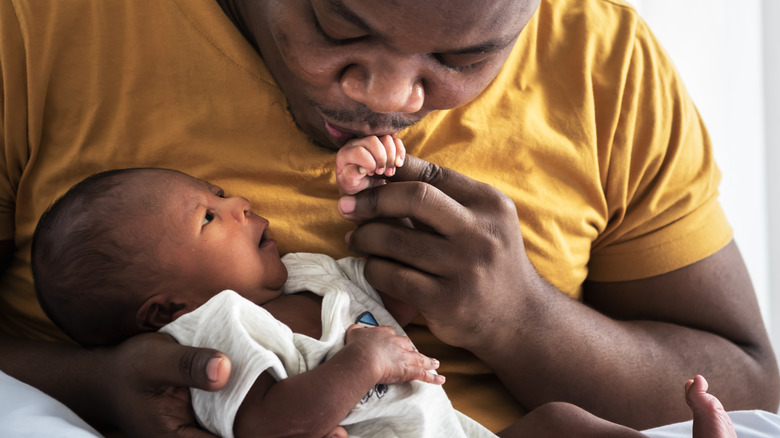Why Do We Use The Word Dad For Father?
For many people, mother and father are rather formal terms for parents. They're mom and dad, mom and pop, ma and pa, or any other nicknames families may have developed over the years.
The tricky thing, though, is that "dad" clearly isn't a simplified version of the more formal word "father." The two words seemingly have no association at all with each other. The word dad is one that millions around the world use without a second thought, and its origins often don't really occur to us.
Why do so many people use dad to mean their father? As Britannica reports, it is simply an informal take on the word father, but its roots are multifaceted and surprising. It seems that the word's evolution is rooted in shifts in the language, as well as in the baby-babble words that infants say while learning how to speak. Here's the curious story of the word dad.
From dada to daddy to dad
Katherine Martin of the Oxford English Dictionary explained that the way in which "babies start to vocalize" had a profound impact on the emergence of the word dad, according to Time. Martin added that, regardless of the language in question, the words we use for fathers and mothers around the world share "unusual similarit[ies]."
As such, it's natural that many infants would be inclined to speak the words dada, papa, daddy, and so on. Words with repeated sounds (such as dada) are the easiest for babies to pronounce as they learn to enunciate. Plus, excitable parents — longing to be called mom or dad — have encouraged their children to say such words/make such sounds for generations. Connections between dada, daddy, and dad are much clearer than those between the words father and dad, and it also seems that the transition from daddy to dad would come about naturally as the child ages.
It seems to be largely thanks to baby talk
The Online Etymology Dictionary states that the word dad was first recorded in the 1500s, and that it is believed to have derived "from child's speech." The fascinating thing, the dictionary adds, is that the word is thought to be an awful lot older than that, saying: "[Dad is] nearly universal and probably prehistoric" in origin.
"Da," similarly, is reported to be "a nursery or provincial abbreviation of dad." Though it's impossible to give a precise origin for the word, this is the prevailing theory. As Roman Jakobson puts it in the study "Why "Mama" And "Papa"?", adults have a tendency to speak to infants in "a kind of pidgin, a typical mixed language, where the addressers try to adjust themselves to the verbal habits of their addressees."
Such words, per Jakobson, can "enter into the general usage of the adult society, and build a specific infantile layer in standard vocabulary." In short, it seems, the more that caregivers try to exhort words like mama, papa, dad, daddy, papa, pop, mom, mommy, and mama from their babies, the more solidified these, and a whole variety of other words, become in languages across cultures.


